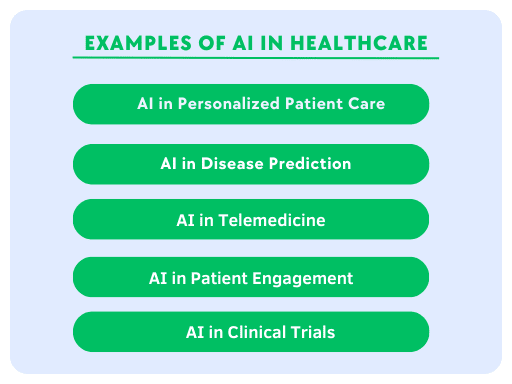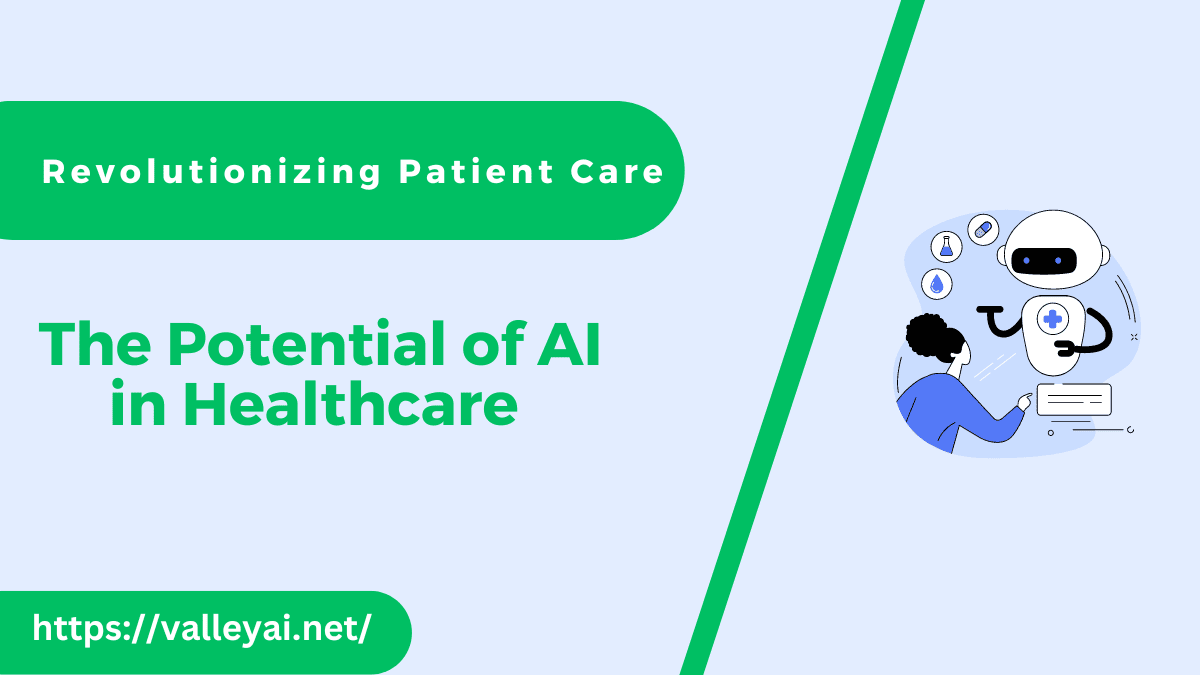During the pandemic, the healthcare industry faced big challenges with limited resources and staff. But there was a ray of hope: artificial intelligence (AI).
AI has already been a game-changer in different fields, and now it’s showing promise in healthcare too. It could transform patient care and bring exciting changes to the future of healthcare.
Let’s see how AI can make a big difference in healthcare!
How Will AI Change the Healthcare Industry?
AI will completely change the healthcare industry by bringing in advanced technologies that improve patient care and make medical processes more efficient.
Thanks to AI-powered algorithms and machine learning, healthcare professionals can quickly access precise and timely information, resulting in faster and more accurate diagnoses.
According to a report by Accenture, in healthcare, artificial intelligence has the potential to save up to $150 billion annually for the U.S. healthcare economy by 2026.
A report published in the l (JAMA) Journal found that an AI algorithm outperformed human dermatologists in accurately diagnosing skin cancer from images.
Deloitte predicts that AI will drive an estimated 35% reduction in healthcare provider costs by 2025.
In 2023, AI in the healthcare market had a value of approximately $11 billion, and it is projected to grow significantly, potentially reaching $188 billion by 2030, according to Statista.
What Are the Challenges of AI in Healthcare?
Despite its potential, AI implementation in healthcare faces certain challenges.
Privacy Concerns With AI in Healthcare
Privacy poses a significant concern when applying AI in the healthcare industry. Patient data contains highly sensitive personal information (PI), including medical history, identity details, and payment information, which falls under strict regulatory guidelines provided by GDPR and HIPAA.
The adoption of healthcare AI is hindered by the extensive data requirements of most AI systems, thereby increasing the risk of data breaches. For instance, HIPAA Journal regularly reports on healthcare data breaches in the U.S., with over 6 million records breached as of October 2022.
Lack of Quality Medical Data
Clinicians need reliable datasets to validate AI models effectively, both from a clinical and technical perspective. Yet, the challenge lies in the fragmentation of medical data across various electronic health records (EHRs) and software platforms, making it difficult to gather patient information and images for testing AI algorithms. To enhance the pool of data available for testing AI systems, the healthcare sector must focus on standardizing medical data techniques.
Clinically Irrelevant Performance Metrics
The criteria for measuring the success of an AI model may not always align with its performance in clinical settings. This disparity between the real-world clinical efficacy and the technical accuracy of AI tests is commonly known as the AI chasm. To bridge this gap, it is essential for developers and clinicians to collaborate and explore how AI algorithms can truly enhance patient care.
How AI Helps Reduce Costs in Healthcare?
AI technology is emerging as a game-changer in the healthcare industry, changing various aspects of patient care and operational efficiency. One significant benefit of AI in healthcare is its ability to reduce costs for healthcare providers and organizations.
Here’s how AI achieves cost reduction in healthcare:
1. Streamlining Administrative Tasks: AI-driven automation optimizes various processes, such as appointment, scheduling, billing, and claim processing. By reducing the manual workload, healthcare organizations can save time and resources.
2. Efficient Resource Allocation: AI-powered algorithms can analyze patient data, predict patient admissions, and forecast healthcare demands. This allows healthcare providers to optimize resource allocation more effectively.
3. Preventive Care and Early Detection: AI’s predictive analytics can identify high-risk patients who require preventive care. By detecting potential health issues early, AI helps prevent costly emergency treatments, hospitalizations, and complications.
4. Resourceful Medical Imaging: AI-powered medical imaging tools enhance diagnostic accuracy, enabling early disease detection and reducing the need for further tests.
5. Minimizing Medical Errors: AI applications like decision support systems help healthcare providers make well-informed clinical decisions, reducing medical errors that can result in costly complications.
6. Optimizing Clinical Trials: AI streamlines clinical trial processes, reducing the time and cost required to bring new drugs and treatments to market.
7. Fraud Detection and Prevention: AI can identify patterns of healthcare fraud and abuse, helping healthcare organizations prevent financial losses due to fraudulent activities.
Examples of AI in Healthcare

AI in Personalized Patient Care
AI has brought remarkable changes in personalized patient care, bringing up a new era of medical services that cater to individual needs.
With the help of artificial intelligence, it has become easy for healthcare professionals to provide personalized diagnostics, accurate diagnoses, and tailored treatment plans, resulting in better patient outcomes. Patients now experience reduced wait times and more precise medical interventions.
Furthermore, AI equips healthcare providers with real-time data, empowering them to make well-informed clinical decisions. This empowers medical professionals to deliver exceptional care and customized treatments, ultimately enhancing the overall healthcare experience.
AI in Disease Prediction
The realm of disease prediction using AI technology is making rapid strides. AI algorithms can now analyze vast datasets, identifying patterns to accurately predict the likelihood of individuals developing specific illnesses.
This advancement holds immense potential for transforming healthcare by enabling early intervention and personalized treatment plans.
AI in healthcare is like having a personalized health advisor! It considers your genes, lifestyle, and environment to give you a risk assessment just for you. It can recommend preventive actions based on your unique needs.
AI’s superpower is its ability to predict health issues accurately. It can foresee chronic illnesses like diabetes, heart attacks, cancer, and heart disease before they happen. That’s some incredible predictive magic right there!
AI in Telemedicine
Telemedicine and AI technology have an outcome as a transformative force in the healthcare industry. It helps patients in remote areas or with mobility issues access quality healthcare from the comfort of their homes.
Real-time data exchange ensures precise and streamlined treatment for each patient. Despite its numerous advantages, telemedicine through AI does face some challenges.
The limitations of virtual appointments compared to in-person visits must be considered, and varying licensure and insurance practices across different states can present hurdles.
AI in Patient Engagement
Patient engagement is a key factor in creating the perfect healthcare environment. And guess what? AI is here to make it better! We can improve patient care, manage data more efficiently, and make smarter clinical decisions.
AI in healthcare engagement is like having a health wizard at your service! And the best part? It saves time and makes the whole healthcare experience super smooth and efficient. So, get ready to counter the power of AI in healthcare engagement! It’s a game-changer!
AI-driven clinical decision support tools like Merative, Viz.ai, and Regard provide valuable insights into patient data, resulting in improved patient outcomes and reduced treatment errors.
AI in Clinical Trials
AI accelerates drug discovery by analyzing extensive biological and chemical data to pinpoint potential drug candidates.
AI also streamlines clinical trial processes by identifying suitable patient populations and predicting treatment responses.
AI-Powered Healthcare: The Future is Now
AI has already made significant steps in transforming healthcare, enhancing personalized patient care, disease prediction, telemedicine, patient engagement, and clinical trials.
As AI technology advances, its potential in areas such as drug research, virtual nursing, and beyond becomes increasingly evident. With ongoing efforts to address challenges and learn about AI’s transformative potential, the future of healthcare delivery appears promising and bright.
FAQ
How is artificial intelligence revolutionizing patient care in healthcare?
Artificial intelligence is transforming patient care in healthcare through advancements in diagnostics, personalized treatments, healthcare operations optimization, early disease detection, and drug discovery.
What is the main role of artificial intelligence in healthcare?
AI algorithms become more precise as they learn from training data, providing humans with unprecedented insights into treatment variability, care processes, diagnostics, and patient outcomes.
What is the importance of AI in healthcare, especially in medical imaging informatics?
By incorporating AI in medical imaging, doctors can swiftly identify conditions, enabling early intervention. A study at Tulane University revealed that AI can proficiently detect and diagnose colorectal cancer from tissue scans, matching or even surpassing the accuracy of pathologists.
- Understanding the Landscape of Cloud Vulnerability Management - March 25, 2024
- Quality Assurance Strategies for Startups: Ensuring Software Reliability - March 5, 2024
- Working of NLP to Improve Copywriting in AI Paraphrasing Tool - February 28, 2024

